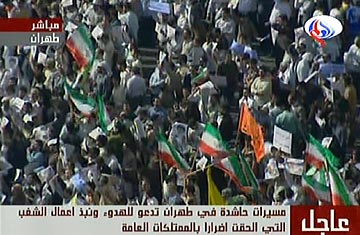
Iran's official Al-Alam television shows Ahmadinejad supporters in central Tehran on June 16, 2009. A ban on foreign media limited coverage of the day's events
(2 of 2)
I spent nearly three weeks in Iran over the winter, talking to clerics, students, street laborers and professionals. People's anger and despair over Ahmadinejad's mismanagement of the economy pulsed throughout Tehran. People were not just discontent; they were punching-the-wall furious. Dismissing opposition to Ahmadinejad as a north Tehran phenomenon, limited only to affluent urban areas, is insulting to the millions of middle-class Iranians who have suffered the most under his tenure. As a rule, affluent Iranians aren't much affected by high inflation and unemployment. As the foreclosure crisis in the U.S. has shown, it is people of modest or low income who feel the pinch when an economy falters.
I started sniffing around the question of the President's much discussed popularity in smaller cities and rural areas. Family and friends whom I trusted, people who spent time regularly outside Tehran, said rural Iranians weren't as pleased with Ahmadinejad as was supposed. For every hospital he had built, there was a promise either undelivered, or delivered so shoddily that the project at hand, a bridge or a road, was unusable. I applied for official permission to report a story on the President's popularity outside Tehran and was turned down. Given the government's constant griping about the Western media only assessing Ahmadinejad through urban attitudes, this seemed suspect.
Despite this, I never for a moment imagined the regime would fix the vote. Others were less sanguine. The thousands of Iranians who were following the run-up to the vote on Facebook fretted about whether the vote would be clean. Each day brought with it a panicked spread of messages about anticipated vote-tampering: take your own pen to the ballot box, Ahmadinejad's supporters are spreading pens whose ink will evaporate after a few hours; don't listen to anyone who tells you that supporters of Mir-Hossein Mousavi are supposed to vote at schools — it's a plot to tamper with his votes.
The notion that Ahmadinejad won this election by a landslide is farcical. And the tepid response of Western governments, who are clearly most concerned with nuclear negotiations under another Ahmadinejad government, has been shameful. If it hadn't been for the extraordinarily high turnout in Friday's election, the fraudulent result would not have been such a watershed moment for Iran. That Iranians buried their cynicism and turned out in such record numbers to vote is what makes this such a bleak and precarious moment for the nation. Any vestige of legitimacy that the government might have had in many Iranians' eyes is now irrevocably lost. Iran is now on par with nations like Egypt and Syria, where leaders are elected by 99% of the vote in sham elections that bear no pretense to democracy.
I am not ashamed of having voted in Iranian elections past, but I have a fresh appreciation for the wisdom of Shirin Ebadi, who from long experience battling the Iranian regime had accurately recognized her foe. And I am still not certain that I will boycott elections in the future. If people had not voted in Iran on such a grand scale, the world would have assumed once again that the people had chosen Ahmadinejad as their President. Now Iranians have made their discontent clear, and though their votes have been discounted, their voices have been heard. Ahmadinejad may remain President of Iran, but his legitimacy has been shaken to its core, not just before his nation but before the world. Iranians managed that by voting, and it is a powerful accomplishment indeed.
Azadeh Moaveni, a former Tehran correspondent for TIME, is the author of Honeymoon in Tehran and Lipstick Jihad. She is co-author of Shirin Ebadi's autobiography.
